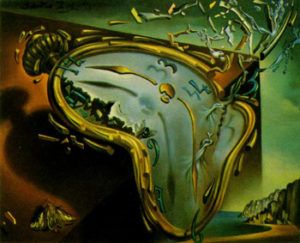Near-hot just at mid-day Monday here in California’s Central Valley as temperatures generate more than just warmth as maybe the weather feels as if it could leap spring altogether, and crunch face-first into summer.
Weather is always newsworthy.
Especially taken as a respite from the sad goings-on in Ukraine, though, weather stories are more dismal items all on their own. Climate change is a way-righteous fear, a new UN IPCC report issued today makes abundantly clear time is fleeting to keep the earth from really, really losing its shit. Paradoxically the war in Ukraine seems to reveal what needs to be done regarding a unified, all-humanity push to save our one-and-only environment.
The UN exposition is not pretty:
"Climate change already worse than expected, says new UN report" by @KieranMulvaney for @NatGeo: https://t.co/snFUVBbv9H#IPCCReport #ClimateImpacts
— Prof Michael E. Mann (@MichaelEMann) February 28, 2022
First, via the Guardian:
Climate breakdown is accelerating rapidly, many of the impacts will be more severe than predicted and there is only a narrow chance left of avoiding its worst ravages, the Intergovernmental Panel on Climate Change (IPCC) has said.
Even at current levels, human actions in heating the climate are causing dangerous and widespread disruption, threatening devastation to swathes of the natural world and rendering many areas unliveable, according to the landmark report published on Monday.
“The scientific evidence is unequivocal: climate change is a threat to human wellbeing and the health of the planet,” said Hans-Otto Pörtner, a co-chair of working group 2 of the IPCC.
“Any further delay in concerted global action will miss a brief and rapidly closing window to secure a liveable future.”In what some scientists termed “the bleakest warning yet,” the summary report from the global authority on climate science says droughts, floods, heatwaves and other extreme weather are accelerating and wreaking increasing damage.
Allowing global temperatures to increase by more than 1.5C above pre-industrial levels, as looks likely on current trends in greenhouse gas emissions, would result in some “irreversible” impacts.
These include the melting of ice caps and glaciers, and a cascading effect whereby wildfires, the die-off of trees, the drying of peatlands and the thawing of permafrost release additional carbon emissions, amplifying the warming further.António Guterres, the UN secretary general, said: “I have seen many scientific reports in my time, but nothing like this. Today’s IPCC report is an atlas of human suffering and a damning indictment of failed climate leadership.”
John Kerry, the US special presidential envoy for climate, said the report “paints a dire picture of the impacts already occurring because of a warmer world and the terrible risks to our planet if we continue to ignore science. We have seen the increase in climate-fuelled extreme events, and the damage that is left behind – lives lost and livelihoods ruined. The question at this point is not whether we can altogether avoid the crisis – it is whether we can avoid the worst consequences.”
…
The report plays down fears of conflicts arising from the climate crisis, finding that “displacement” and “involuntary migration” of people would ensue but that “non-climatic factors are the dominant drivers of existing intrastate violent conflicts”.But Jeffrey Kargel, a senior scientist at the Planetary Science Institute in the US, said: “The current warfare activity in eastern Europe, though not attributable to climate change, is a further caution about how human tensions and international relations and geopolitics could become inflamed as climate change impacts hit nations in ways that they are ill-prepared to handle.”
Context on the Ukraine factor — per The Washington Post:
The enormity of the world’s task to slow climate change was underscored by another escalating crisis this week, as Russian troops invaded Ukraine while representatives from 195 countries worked to finalize the IPCC report.
The head of the Ukrainian delegation, Svitlana Krakovska, continued to participate in the virtual meeting in recent days, even as bombs fell on her home city of Kyiv.
The violence only underscored the dangers facing all people as the planet warms, she told an international gathering of negotiators over the weekend, according to two participants.“Human-induced climate change and the war on Ukraine have the same roots: fossil fuels and our dependence on them,” Krakovska said in an impassioned speech Sunday.
“We will not surrender in Ukraine. And we hope the world will not surrender in building a climate-resilient future.”
If the world can face Vlad Putin, so we must face climate change — finally, some more grim shit from the IPCC report per National Geographic:
The recognition that climate impacts are already being felt increases the urgency of limiting further warming.
On land, up to 14-percent of species will likely face “very high risk of extinction” at global warming levels of 1.5°C (2.7°F), says the report; that figure increases to as much as 18-percent at 2°C (3.6°F), and all the way up to 48-percent at 5°C (9°F). (If the world’s nations keep their current promises to reduce emissions, a recent analysis found, warming will be kept under 2.5ºC.)At 2°C or higher of warming, human food security risks due to climate change will be more severe, leading to nutrient deficiencies and malnutrition, particularly in Sub-Saharan Africa, South Asia, Central and South America, and small island states.
Furthermore, as temperatures continue to climb, climate change impacts and risks are likely to become “increasingly complex and more difficult to manage,” with multiple hazards—from droughts and wildfires to sea-level rise and floods—occurring simultaneously.
Other than that, cool.
Unless we’re on some kind of horrible brink:
Sadly yet, once again here we are…
 (Illustration out front: Salvador Dali’s ‘Soft Watch at the Moment of First Explosion,’ found here).
(Illustration out front: Salvador Dali’s ‘Soft Watch at the Moment of First Explosion,’ found here).